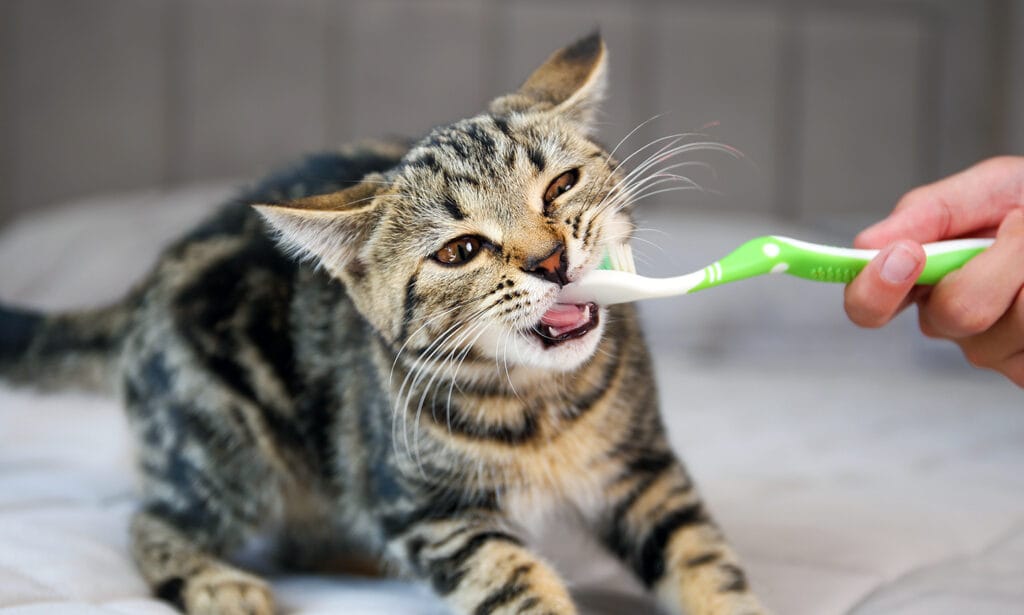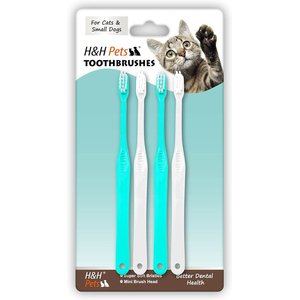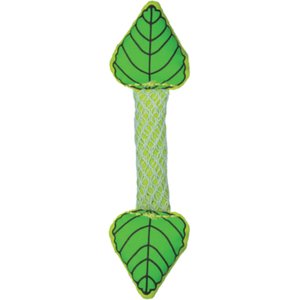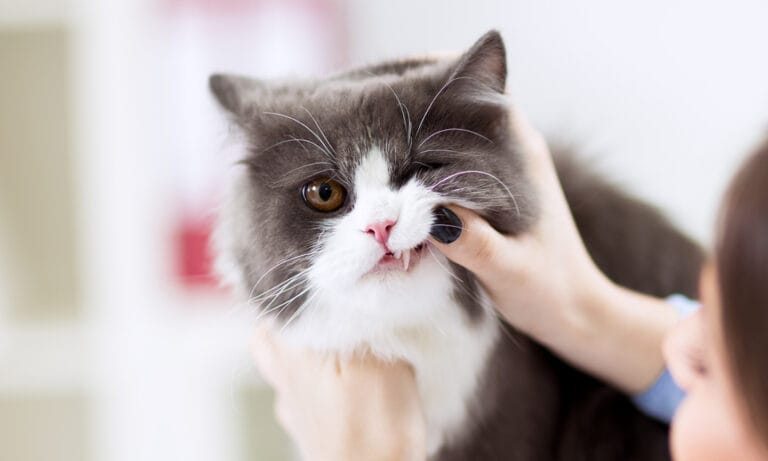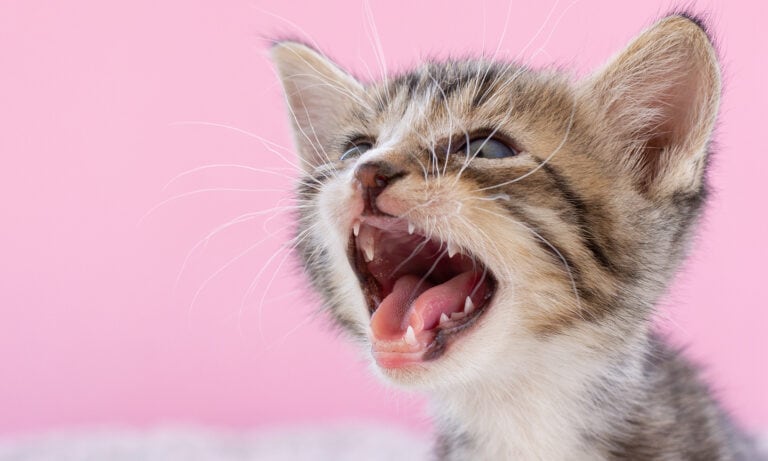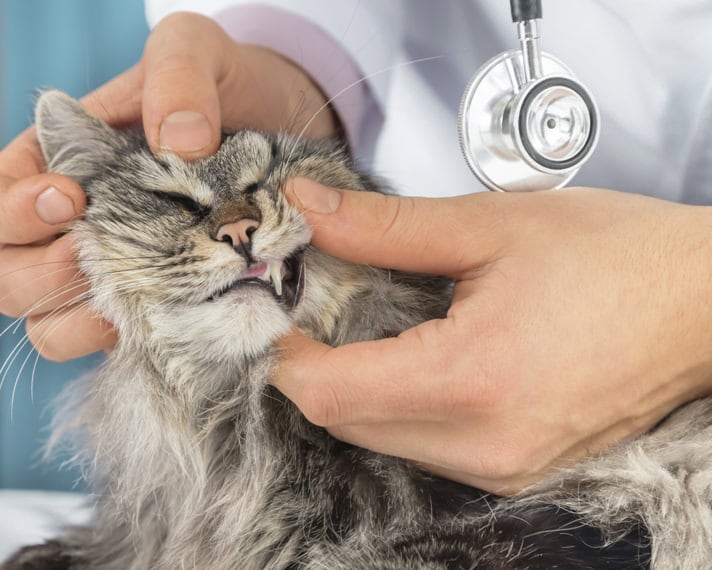When we think of our fiercely independent felines, we know they can do plenty on their own. After all, they groom themselves and decide when they want affection—and succeed in getting all the pets and scratches! But due to their lack of opposable thumbs, they could use some help with one task in particular: keeping their precious little cat teeth clean.
While the idea of cleaning your kitty’s teeth might sound impossible, dental care is essential to a cat’s overall health.
We spoke with veterinary experts about the best ways to keep cat teeth clean, what to look for in dental products, and other recommendations that are worth trying as a pet parent.
7 Ways To Keep Cat Teeth Clean
Keeping your cat’s teeth clean can reduce the likelihood of dental issues, such as gingivitis, tooth decay and tooth loss, as well as gum disease.
Here are the best methods recommended by veterinarians to include in your cat’s dental care routine to ensure their optimal oral health.
1Brush Your Cat’s Teeth (Here’s How!)
“Brushing a cat’s teeth regularly is crucial for maintaining their oral health,” says Dr. Sabrina Kong, DVM, Certified Canine Rehabilitation Practitioner at Jules Veterinary Center in Tracy, California, and veterinary consultant at WeLoveDoodles.com.
Ideally, a cat’s teeth should be brushed daily, “but even brushing several times a week can significantly reduce the risk of dental problems like periodontal disease,” Dr. Kong says.
Use only a cat-specific toothpaste and cat toothbrush. Human toothpaste and toothbrushes aren’t suitable for cats.
Below is a step-by-step on how to brush your cat’s teeth (you can also watch the video above!):
- Practice lifting your cat’s lips to prepare them for teeth brushing.
- Introduce them to their toothbrushing supplies.
- Gently brush their teeth and move along their gumline to get them comfortable with the process.
- Clean more of their teeth as they get used to the routine.
- Reward your cat with plenty of praise, toys or treats.
2Offer Cat Dental Treats
Looking for an easy, effective way to keep a finicky pet’s teeth clean? Dental treats can help.
“Cat dental treats promote dental health through their abrasive texture, which helps remove plaque and tartar as cats chew,” says Dr. Nicole Savageau, VMD, a veterinarian with The Vets in Austin, Texas.
Dental treats are made with ingredients like enzymes and calcium to provide dental benefits. They’re also made to taste delicious to cats, increasing the likelihood of cats using them regularly.
However, Dr. Savageau emphasizes that dental treats should complement, not replace, other essential dental care methods such as regular brushing and vet checkups. She advises consulting your vet to develop a personalized dental care plan tailored to your kitty.
When buying dental treats for cats, Dr. Savageau recommends looking for the following:
- Vet approval: Dental treats that have been approved or accepted by veterinary associations indicates the product has undergone evaluation for safety and efficacy. You can find this information on the product packaging.
- Lots of texture: Textured treats promote chewing and can help reduce plaque and tartar. Some have a particular design, like ridges or a twisted shape, to enhance their cat-teeth-cleaning action, Dr. Savageau says.
- High-quality ingredients: As you check the ingredients list, look for wholesome ingredients like chicken, beef or fish meal as the primary protein source, as well as chlorophyll or enzymes, as they can be beneficial to a cat’s dental hygiene. If possible, steer clear of treats with excessive fillers, artificial preservatives and additives.
- Firm consistency: The treats should be firm enough to chew but not so hard that they can potentially damage your cat’s teeth. You'll also want to make sure the treat is a comfortable size for your cat based on their breed and size (as in, they shouldn't be small enough for cats to swallow whole).
- Appropriate calorie content: If your kitty is on a calorie-restricted diet, consider how many calories are in dental treats since some may contain a high amount. To prevent unwanted weight gain in your cat, Dr. Savageau recommends adjusting their daily caloric intake accordingly.
And as with any new treat or food, consult your vet to learn if the treat is a suitable choice based on your cat’s individual health needs and dietary requirements.
Dr. Kong recommends the following cat dental treats:
3Ask Your Vet About Dental Cat Food
Just like us, nutrition impacts your feline friend’s oral health. Dental cat food is designed to reduce tartar and plaque buildup; it’s made to be larger in size compared to regular cat food and has a specific texture that requires more chewing, Dr. Kong explains. As your cat chows down on their food, they’re not only enjoying the taste, but they’re also cleaning their teeth.
As with other methods of keeping your cat’s teeth clean, Dr. Kong says a dental diet can effectively maintain dental hygiene but is not a substitute for regular brushing. Consult your vet prior to putting your cat on a dental diet to learn if it will meet their specific needs.
In addition to dental cat food, Dr. Savageau says that certain dietary supplements, such as those containing ingredients like omega-3 fatty acids, can support oral health.
Dr. Kong recommends the following dental cat food:
4Take Your Cat in for Professional Dental Cleanings
Even if you brush your kitty’s teeth at home, you may wonder, “Is professional teeth cleaning necessary for cats?” The answer is “Yes!”
“These cleanings allow for a thorough examination of the cat’s mouth, including areas that are difficult to reach with regular brushing,” Dr. Kong says. “Dental cleanings usually involve scaling to remove plaque and tartar and polishing the teeth.”
While the frequency of professional cleanings depends on each cat’s individual needs, Dr. Kong says a cleaning every one to two years is generally beneficial.
“Regular dental care, including professional cleanings, remains essential for maintaining optimal oral health in cats,” Dr. Savageau says.
How Much Does a Cat Dental Cleaning Cost?
The cost of a cat dental cleaning can range from a few hundred dollars to over $1,000, depending on the geographic location, the complexity of the procedure and the veterinary practice, Dr. Kong says.
She adds that the cost typically includes anesthesia, since cleaning a cat’s teeth without it is typically unfeasible and not recommended. “Anesthesia is necessary for a thorough cleaning and to ensure the safety and comfort of the cat during the procedure,” Dr. Kong explains.
She recommends regular veterinary checkups to determine the best course of action for your cat’s dental needs.
5Try Water Additives for Cats
Water additives are solutions that can simply be added to your cat’s water to help maintain their oral hygiene.
Dr. Savageau considers water additives to be crucial in promoting a cat’s dental health by:
- Preventing plaque and tartar formation
- Supporting gum health
- Controlling bad breath
- Encouraging hydration
If you’ve faced challenges with traditional dental care methods, such as brushing, Dr. Savageau suggests trying water additives, which offer a convenient solution. However, to ensure the ongoing dental health of your cat, she emphasizes that water additives should be used in conjunction with regular dental checkups, professional dental cleanings and a balanced diet, rather than being viewed as a sole remedy.
“Choosing the right water additive for your cat involves considering several factors to ensure it is safe, effective and well-suited to your pet’s needs,” she says.
Per Dr. Savageau, below are key aspects to consider when picking a water additive for your cat:
- Veterinarian approval: To ensure a product is safe and effective in promoting dental health, opt for water additives that are veterinarian-approved or recommended.
- Ingredients that are not only safe but also help support oral health: Look for water additives with ingredients like enzymes, antimicrobial agents or other compounds known to support cats’ oral health and to be cat-safe.
- A flavor your cat likes: “Cats can be selective about the taste of their water,” Dr. Savageau says. “Choose a water additive with a flavor that your cat is likely to find palatable. If your cat enjoys the taste, they are more likely to drink the treated water willingly.”
- Ingredients that help control odor: If your kitty has bad breath, some water additives can include ingredients like chlorhexidine and stabilized chlorine dioxide that can be beneficial in combating oral malodor.
Lastly, some water additives need to be measured and mixed, while others come pre-dosed. Dr. Savageau recommends considering the ease of incorporating the water additive into your cat’s routine.
Dr. Kong recommends the following water additives:
6Get Your Cat a Few Chew Toys
To make teeth cleaning fun, get your feline friend a few chew toys. These dental-friendly toys encourage chewing, providing them with mental stimulation and helping reduce plaque and tartar buildup, Dr. Savageau says.
Here are a couple of our favorites:
7Look Into Dental Wipes or Gels
Dental wipes or gels are another convenient method for helping to keep your cat’s teeth clean. Dr. Savageau recommends using veterinary-approved dental wipes or dental gels. They can be applied with a gentle swab or massaged onto your cat’s teeth to help keep plaque at bay.
Here are a couple of products to try:
Share:
